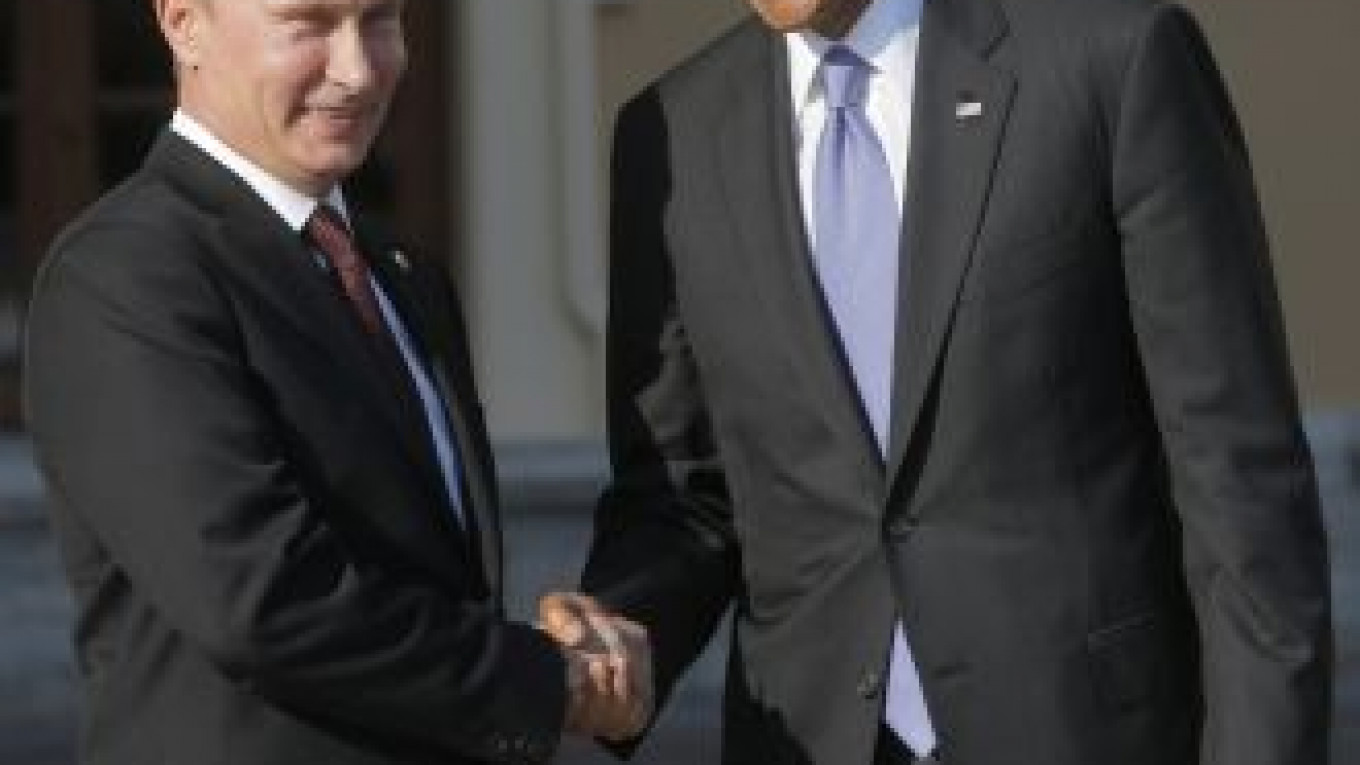Financial and economic matters seemed a mere afterthought at the G20 on Thursday as many EU and BRICS nations united to informally oppose U.S. President Barack Obama’s call for military intervention in Syria.
The Syria conflict seems to have made Obama the odd man out and given President Vladimir Putin the upper hand at the meeting of leaders of the top 20 nations, as Obama’s calls for military intervention against Syrian President Bashar Assad now find support with only one of the 28 EU nations — France.
The ongoing debate over Syria stole the summit’s agenda before it even began, with European Council President Herman Van Rompuy saying beforehand at St. Petersburg’s Peterhof Palace that the EU would only support a political solution to the conflict, which has now claimed more than 100,000 lives.
Van Rompuy was careful to avoid giving any concrete prescriptions about the Syria crisis, however.
“Any action has to involve a long-term view, and everybody has to realize that there is no quick solution to the Syria crisis,” Van Rompuy said.
At the same time, he was firm in saying that “there is no military solution to the Syria conflict, only a political solution can end the terrible bloodshed.”
He went on to call the chemical attack — which the U.S. says was carried out by government forces and killed 1,429 people — “an atrocious act” and a “cynical use of weapons of mass destruction that can’t be tolerated.”
The international community must work together to prevent such incidents in the future, he said, both in Syria and in other countries. In this regard, he said, the EU respected the recent call for intervention but believed the decision should be left up to the United Nations.
He also said various sources confirmed that the chemical attack had taken place and that it was carried out by the Syrian regime because “that’s the only one who could posses chemical weapons in Syria.” But he added that he hoped UN Secretary General Ban Ki Moon would present the results of the UN chemical weapons team in the near future.
Putin, who has been perhaps the most vocal in opposing Obama’s calls for a military strike against Syria, said on the eve of the summit that only the UN Security Council could sanction military action against another country. Russia has said repeatedly that Syrian rebels may have been behind the attack in a bid to lure the West into war.
President of the European Commission José Manuel Barroso also commented on the chemical attack in Syria, calling it “the biggest tragedy on our hands” and saying the international community must come to a decision about how to respond to it. Putin’s spokesman Dmitry Peskov said BRICS member states all agreed that using force against Syria would “negatively influence the global economy.”
Yet the Syria crisis is just one issue that has pitted Obama against other nations. Several nations at the G20 also reportedly expressed discontent over the revelations that came to light thanks to Edward Snowden, the former U.S. spy agency contractor who leaked confidential information about U.S. surveillance programs.
According to Peskov, all five BRICS nations voiced concerns over the surveillance programs, which reportedly covered some BRICS member states.
“Their discontent was clear and there were statements that such an activity by the intelligence services could be compared with terrorism,” Peskov said.
The Snowden scandal fractured U.S.-Russia relations in early August after Obama canceled a bilateral meeting with Putin upon learning of Snowden’s asylum in Russia. That meeting was meant to take place on the sidelines of the G20.
But the two presidents are still bound to meet at the event this weekend. “They will be at the same event for two days, certainly there will be a contact between them,” Peskov said.
Sergei Ivanov, head of the Russian presidential administration, expressed indignation over another matter, saying recent accusations by U.S. Defense Secretary Chuck Hagel that Russia supplied the Syrian government with chemical weapons was “nonsense.”
“Throwing such accusations around is beyond the realms of any reason,” he said.
As for Syria, Ivanov said U.S. military intervention would be illegitimate regardless of whether or not Congress gave its approval.
Contact the authors at i.nechepurenko@imedia.ru and e.kravtsova@imedia.ru
A Message from The Moscow Times:
Dear readers,
We are facing unprecedented challenges. Russia's Prosecutor General's Office has designated The Moscow Times as an "undesirable" organization, criminalizing our work and putting our staff at risk of prosecution. This follows our earlier unjust labeling as a "foreign agent."
These actions are direct attempts to silence independent journalism in Russia. The authorities claim our work "discredits the decisions of the Russian leadership." We see things differently: we strive to provide accurate, unbiased reporting on Russia.
We, the journalists of The Moscow Times, refuse to be silenced. But to continue our work, we need your help.
Your support, no matter how small, makes a world of difference. If you can, please support us monthly starting from just $2. It's quick to set up, and every contribution makes a significant impact.
By supporting The Moscow Times, you're defending open, independent journalism in the face of repression. Thank you for standing with us.
Remind me later.






